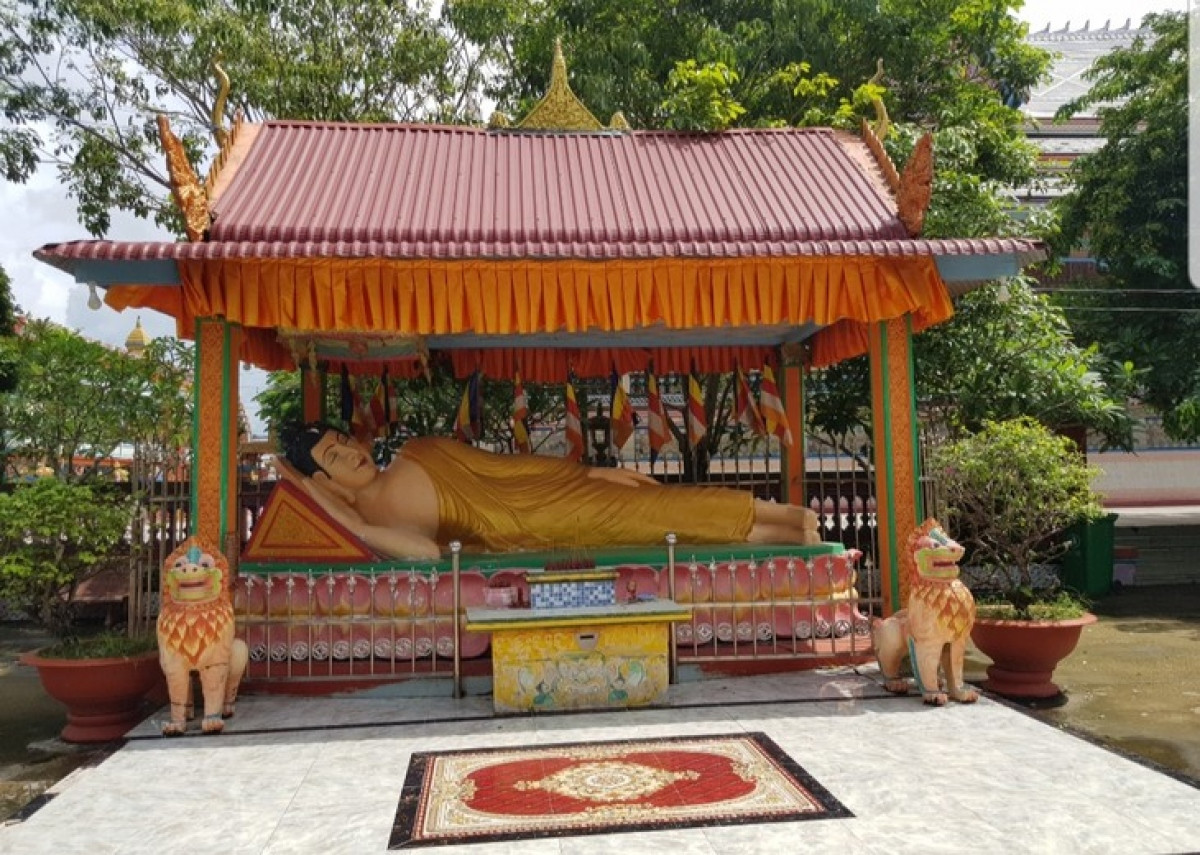

Built in 1815, the pagoda features typical Khmer architecture and decorations with cups, bowls, and dishes on the walls and towers, creating an impressive work of art.
The first impression when visitors arrive at the pagoda is the three-entrance gate with three towers carved with colorful patterns in the traditional Cambodian style. The center tower stands out with a glass box, which houses a solemn sitting Buddha statue.
Around the pagoda is a fence decorated with the images of Apsara dancing goddess, symbolizing peace and prosperity.
On both sides of the path to the pagoda are statues of the Kerno goddess, who has the face of the Apsara goddess, symbolizing eternal beauty, and the body of the Garuda mythologic bird, symbolizing power.
The campus of Chen Kieu pagoda has many green trees, creating a pleasant atmosphere.
Nguyen Thi Nhung, a tourist from Hanoi, said, “The ancient pagoda is spacious and the atmosphere is quiet and fresh. What impressed me most is the ceramic bowls and cups used to build the walls and stairs. The carved patterns are stunning, vivid, and sophisticated. If I have another opportunity, I will return here.”

At the main hall, all columns are decorated with statues of the goddess Kerno with spread wings and raised hands to support the roof. Around the pillars are carvings of images from Khmer mythology.
On both walls there are paintings telling the story of Shakyamuni Buddha from his birth to his enlightenment. The walls and paintings are decorated with broken pieces of cups, plates, and bowls. The altar displays 20 Buddha statues in standing, lying, and sitting postures.
In the middle of the pagoda’s yard is a flagpole, which features the Naga god snake with 5 heads, referring to the legend of the snake multiplying its head to protect the Buddha when he was meditating. Behind the pagoda is a garden which tells the entire life of Shakyamuni Buddha, from birth to enlightenment.

Venerable Kim Hoang Hung, abbot of Chen Kieu Pagoda, said, “Khmer Theravada Buddhism worships only Shakyamuni Buddha. Because our predecessors had a limited budget to build the pagoda, they proposed using cups and bowls as materials."
"The pagoda’s architecture is similar to other Khmer Theravada pagodas in Soc Trang province. There is a sala house, a monastery, a school, a room to display antiques, a main hall, and Buddha statues. There are many Chinese residents in the neighborhood, so the pagoda’s architecture has bold Chinese characteristics," he added.
Chen Kieu pagoda is modeled as a cup, built with many cups and plates, and decorated with broken ceramic pieces, so it’s also called the ‘cup pagoda’ by the local people.
An attractive feature at Chen Kieu pagoda is that it preserves some assets of Tran Trinh Huy, nicknamed Cong Tu Bac Lieu, which is loosely translated as Bac Lieu prince.
Born in 1900 and passing away in 1973, Bac Lieu Prince was a famous, rich man in the South in the early 20th century. Among the assets, the most impressive items are a set of wood couches and table, the summer bed made of marble, and the winter bed made of sandalwood.
Ngo Huu Loi, a tourist from Binh Duong province, said, “The visitors are impressed by the assets of Bac Lieu Prince. The hot bed for summer and the cold bed for winter are impressive. This is my third visit to Chen Kieu Pagoda. Each time, I have a different feeling.”
Visiting Chen Kieu Pagoda, visitors admire its unique architecture, learn about the Khmer culture, take photos in the brilliant sunflower garden, and enjoy food specialties of Soc Trang province.
Source: VOV